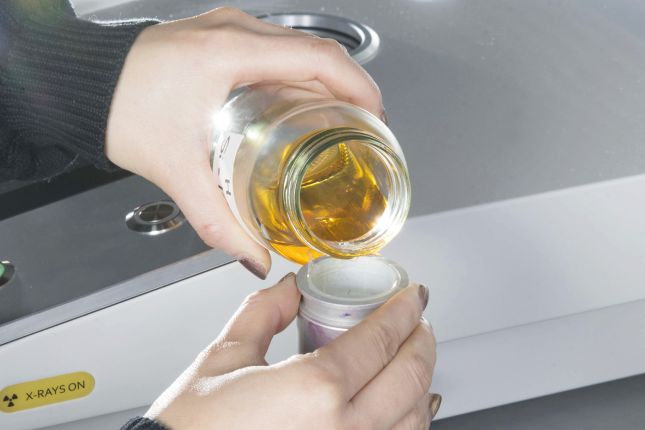X-ray Fluorescence (XRF) is the accepted method of testing sulfur content in petroleum products, and it is supported by international standards test methods (ASTM, ISO, JIS etc.) The process is non-destructive, fast and accurate. A testing regimen with traceable documentation for each batch will ensure biofuel shipments meet the specifications and are not rejected by refineries.
The Hitachi X-Supreme8000 benchtop XRF analyzer is ideally suited for the rapid and accurate analysis of biofuel within a production environment. With full traceability and documentation, providers of biofuel can demonstrate compliance to current sulfur limits.
From 2018, new biofuel targets within the Renewable Transport Fuel Obligation (RTFO) have been set. The aim is to dramatically increase the percentage of biofuels used in the UK’s transport sector over the next fifteen years. This spells a real opportunity if you specialise in quality biodiesel supply, especially recycling waste products into biofuels.
The new RTFO came into force on 15th April 2018 immediately hiking the percentage of biofuel from 4.75% to 7.25% for suppliers mandated by the scheme. From 2019 the percentage of biofuel of total fuel, by volume, will then steadily increase each year until reaching 12.4% on 1st January 2032.

The RTFO is mandatory for those who supply 450,000 litres or more of transport fuel to UK markets, such as haulage firms. However, for the first time, aviation fuels are covered, and although not mandatory, biofuels used in aviation in the UK are eligible for reward under the RTFO.
To address the potential issue of possible overuse of arable land for fuel crops, the RTFO has issued a limit on the percentage of biofuel that is derived directly from crops, such as cereals, tubers and root crops, and corm crops. Termed ‘the crop cap’, the maximum allowable limit of crop-derived biofuel drops from 4% in 2018, to 2% in 2032.
To further the support for sustainable biofuels, the regulation sets out a target for advanced waste-based renewable fuels, termed developmental fuels. The target for 2019 is 0.05%, steadily rising to 1.4% by 2032.
A fuel mixed from biofuel and fossil fuel must meet the specifications governing that fuel type, i.e BS EN: 228 for petrol, or BS EN: 590 for diesel. In particular, the level of sulfur needs to be kept below the current specification limit to meet environmental targets. Providers of crop-derived and waste-derived biofuels will need to test their product prior to shipping to ensure it is not rejected by refineries.
In addition, the level of chlorine in biofuels also needs to be carefully monitored. Excess chlorine in fuel causes corrosion of the process equipment used within a refinery, and refineries will impose their own limits on chlorine levels.
The Hitachi X-Supreme8000 benchtop XRF analyzer is ideally suited for the rapid and accurate analysis of biofuel within a production environment. With full traceability and documentation, providers of biofuel can demonstrate compliance to current sulfur limits.
With very little sample preparation, the X-Supreme8000 is easy to use, even by non-laboratory operators, and can analyze up to 10 samples in one run. It can be pre-calibrated for sulfur content determination and complies with standard test methods of determining sulfur in petroleum products, including:
With the speed, accuracy and built-in traceability of the Hitachi X-Supreme8000, you can ensure your biofuels meet the grade to help you compete within this fast-growing industry sector.
For more information on the X-Supreme8000 XRF analyzer, you can get more details here, or contact us to arrange a demonstration.
Find out more